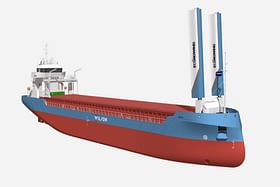In a boost to India’s ambition to become a global shipping hub, the Udupi Cochin Shipyard Limited (UCSL) has bagged an international shipbuilding order from Wilson ASA, a leading European player in the short-sea market, for supply of six new generation diesel electric cargo vessels.
UCSL at Malpe in Udupi is a fully-owned subsidiary of Cochin Shipyard Limited (CSL), the largest shipbuilder in India.
The Rs 580 crore “future proof dry cargo vessel” project involves the design and construction of six general cargo vessels, with an option for eight more vessels. These vessels are intended for the transport of general cargo at inland as well as coastal waters of Europe.
Designed by Conoship International, the Netherlands, the 3,800 deadweight tonnage (DWT) vessel is an innovative general cargo vessel for the short-sea shipping trade.
The powering and propulsion of the vessel is by means of electro motors in combination with diesel generator sets. The propeller has a large diameter ensuring, the best possible efficiency, and lowest possible fuel consumption. The design provides the possibility of an easy conversion of the type of fuel in the future with an option for installation of battery hybrid systems.
The first vessel will be delivered by December 2024 and thereafter deliveries will be completed within March 2026.
Headquartered in Bergen, Norway, Wilson ASA is the largest short sea fleet in Europe and transports about 15 million tonnes dry cargo across Europe using a fleet of around 130 vessels ranging from 1,500 to 8,500 DWT.
Short Sea Shipping
Short sea shipping, abbreviated as SSS, is the maritime transport of goods over relatively short distances, as opposed to the intercontinental cross-ocean deep sea shipping.
Thus, SSS doesn’t transit oceans or deep waters like ocean freights but uses coastal and inland waterways to transport goods to ports. Therefore, short sea shipping represents a reliable alternative to road transport across land borders.
Eco-Friendly Transportation Solutions
The development marks a surprise reversal of trend as India has now started supplying ‘green ships’ to traditional shipbuilding nations like Norway, Germany and the US.
Recently, state-run Cochin Shipyard has made significant progress in the field of sustainable shipping. The company has delivered two fully electric cargo ferries to Norway and has many more orders in the pipeline. CSL has also secured contracts to build two vessels for European clients that will run on methanol.
Furthermore, the shipyard has signed contracts with Norwegian clients to construct two container vessels that will be powered by green hydrogen.
Additionally, CSL has secured a contract to supply eight ‘eco freighter’ 7,000 DWT multi-purpose vessels to HS Schiffahrts Gruppe, Germany. This association with HS Schiffahrts group marked CSL’s entry into the European Shortsea shipping market, where these vessels are an integral part of the logistics network from North Sea ports to the south Mediterranean ports.
Shipping minister Sarbananda Sonowal in a recent interview said that more such orders are expected to be placed by European clients with Indian shipyards.
“Most advanced countries are placing orders for vessels with Indian companies. This is a clear indication that ‘make in India’ is becoming successful and Atmanirbhar Bharat initiative is getting strengthened,” Sonowal said.


